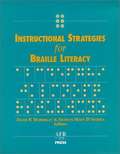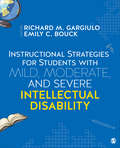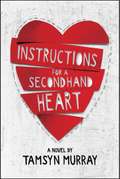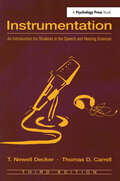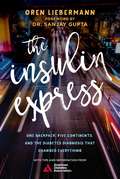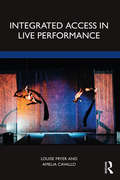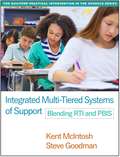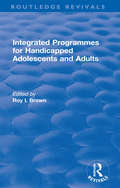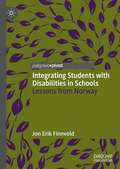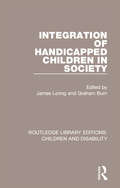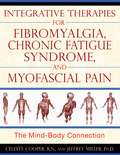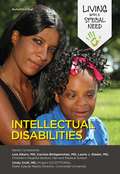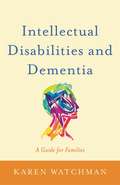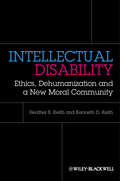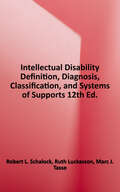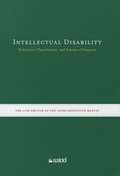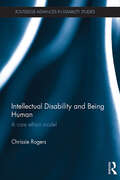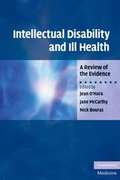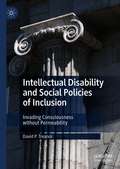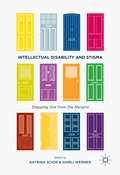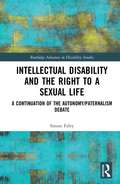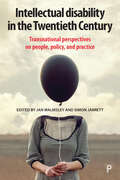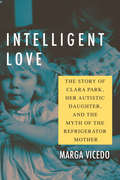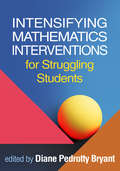- Table View
- List View
Instructional Strategies for Braille Literacy
by Diane P. Wormsley Frances M. D'AndreaOffers instructors specific, practical strategies for the teaching of Braille reading and writing. Chapters discuss general guidelines and strategies; fostering emergent learning; making the transition from print to Brail teaching Braille to students with special needs, and to students who speak English as a second langua assessing the literary skills of students who are blind or visually impaired; and technology and Braille. Annotation copyrighted by Book News, Inc. , Portland, OR
Instructional Strategies for Students With Mild, Moderate, and Severe Intellectual Disability
by Richard M. Gargiulo Emily C. BouckStrategies for Students with Mild, Moderate, and Severe Intellectual Disabilities is a textbook for undergraduate and graduate students enrolled in special and general education teacher preparation programs (as well as practicing professionals) offering a solid, research based text on instructional methodologies for teaching students with intellectual disability across the spectrum of intellectual abilities. The book addresses both academic and functional curricula in addition to behavioral interventions. Additionally, Instructional Strategies for Students Mild, Moderate, and Severe Intellectual Disability adopts developmental or life span approach covering preschool through adolescence and young adulthood.
Instructional Strategies for Students With Mild, Moderate, and Severe Intellectual Disability
by Richard M. Gargiulo Emily C. BouckStrategies for Students with Mild, Moderate, and Severe Intellectual Disabilities is a textbook for undergraduate and graduate students enrolled in special and general education teacher preparation programs (as well as practicing professionals) offering a solid, research based text on instructional methodologies for teaching students with intellectual disability across the spectrum of intellectual abilities. The book addresses both academic and functional curricula in addition to behavioral interventions. Additionally, Instructional Strategies for Students Mild, Moderate, and Severe Intellectual Disability adopts developmental or life span approach covering preschool through adolescence and young adulthood.
Instructions for a Secondhand Heart
by Tamsyn MurrayA moving novel about grief, guilt, and the unpredictability of love, for fans of Everything, Everything and All the Bright Places. Jonny knows better than anyone that life is full of cruel ironies. He's spent every day in a hospital hooked up to machines to keep his heart ticking. Then when a donor match is found for Jonny's heart, that turns out to be the cruelest irony of all. Because for Jonny's life to finally start, someone else's had to end. That someone turns out to be Neve's twin brother, Leo. When Leo was alive, all Neve wanted was for him (and all his glorious, overshadowing perfection) to leave. Now that Leo's actually gone forever, Neve has no idea how to move forward. Then Jonny walks into her life looking for answers, her brother's heart beating in his chest, and everything starts to change. Together, Neve and Jonny will have to face the future, no matter how frightening it is, while also learning to heal their hearts, no matter how much it hurts.(Features select illustrations from "Jonny's" sketchbook.)
Instrumentation: An Introduction for Students in the Speech and Hearing Sciences
by T. Newell Decker Thomas D. CarrellWhile keeping the scope and essential thrust of the original book unchanged, this third edition has been updated to reflect the latest technology. For instance, important revisions have been made to a few chapters, while one chapter has been eliminated and replaced with a newer chapter dealing with recent developments in digital and consumer electronics that are relevant to laboratory instrumentation. The authors hope the readers of this text will be more confident with instrumentation and more willing to experiment with it, as well as be able to appreciate the possible ways that electronic instrumentation can be used in their work. The book was written with the undergraduate in speech and hearing sciences uppermost in mind. Instead of detailed information about individual pieces of instrumentation, a more basic and broad descriptive approach has been used. Throughout, examples have been provided regarding how certain pieces of equipment can be used in the clinic or laboratory. One or more step-by-step exercises are included at the end of certain chapters to help students obtain hands-on experience and equipment flowcharts help reinforce the exercise. Students who complete this book will have a basic understanding of the major pieces of instrumentation in the hearing and speech clinic/laboratory.
The Insulin Express: One Backpack, Five Continents, and the Diabetes Diagnosis That Changed Everything
by Oren LiebermannA travel memoir through thirty countries, a thousand insulin injections, and one man’s journey from despair to confidence. With tips and information from the American Diabetes Association.In the middle of a yearlong backpacking trip around the world with his wife, Oren Liebermann is teaching English to young Buddhist monks in Pokhara, Nepal, when his body begins to fail him. He is constantly thirsty and exhausted, and by the time he steps on a scale, he has lost forty-five pounds. At a local clinic, a doctor gives him a diagnosis that will change his life forever: "I’m sorry to tell you, my friend, that you are a diabetic.”Devastated, Liebermann is trapped in a freezing hospital room, trying to recover enough to fly home. His friends and family urge him to call off the rest of his trip. He had quit his job as a TV news reporter for this dream-come-true journey, but the nightmare diagnosis has thrown his world into disarray. However, Liebermann and his wife, Cassie, make a decision. They have an adventure to finish, and he has the rest of his life to live.Bold, raw, and poignantly candid, The Insulin Express tells the story of what happens when the best-made travel plans are subject to the ever-present chaos of life, and how a major setback can turn into the opportunity of a lifetime. Despite struggling with a chronic disease that almost kills him in the Himalayas, Liebermann hikes along the Great Wall of China, conquers the Inca Trail to Machu Picchu, and sips cobra whiskey in Laos. What begins as a travel chronicle across thirty countries transforms into a single journey of resilience and self-discovery-going from hopelessly lost and then wonderfully found.
Integrated Access in Live Performance
by Louise Fryer Amelia CavalloTwelve per cent of UK theatregoers have a disability. This compares with 18% of the UK’s adult population. Directors can help build audiences as diverse as the population at large by making their art accessible to all. Live performances are increasingly being made accessible to people with sensory impairments not only to satisfy equality laws and the requirements of funding bodies, but also in the interest of diversity and as a catalyst for creativity. But how do you ensure you don’t throw out the access baby with the artistic bathwater? This book draws on the results of the Integrated Access Inquiry: Is It Working? A qualitative study with 20 theatremakers from around the UK, it was commissioned by Extant Theatre – the UK’s leading company of blind and visually impaired people, and combines feedback from disabled audiences with advice from the creative teams who have experimented with integrating access. It discusses the challenges and opportunities of working with disabled actors and building in audience access even before rehearsals begin. It offers strategies, case studies and a step-by-step guide to help creative people integrate access into their live performance for the benefit of all.
Integrated Multi-Tiered Systems Of Support: Blending Rti And Pbis (The Guilford Practical Intervention In The Schools)
by Kent McIntosh Steve GoodmanMany schools have implemented academic response to intervention (RTI) and schoolwide positive behavioral interventions and supports (PBIS) as separate initiatives. This book provides keys to making these programs more effective, seamless, efficient, and sustainable by combining them into a single multi-tiered system of support (MTSS). Steps and strategies are outlined for integrating data structures, practices, teams, and district systems. Contributing authors present detailed case examples of successful MTSS implementation in three states. In a large-size format with lay-flat binding, the book features 27 reproducible checklists and evaluation tools. Purchasers get access to a companion website where they can download and print the reproducible materials plus other helpful resources. <p><p> This book is in The Guilford Practical Intervention in the Schools Series, edited by T. Chris Riley-Tillman.
Integrated Programmes for Handicapped Adolescents and Adults
by Roy I. BrownFirst published in 1984, Integrated Programmes for Handicapped Adolescents and Adults explores the need to develop integrated programmes for adolescents and adults with developmental disabilities. Whilst the training models and concepts examined largely relate to formal areas of education, such as reading, mathematics, and writing, the book also pays close attention to social education skills, including home management, budgeting, meal preparation, and the development of positive familial relationships. Integrated Programmes for Handicapped Adolescents and Adults presents a number of projects from different parts of the world, with an emphasis on linking research and practice.
Integrating Students with Disabilities in Schools: Lessons from Norway
by Jon Erik FinnvoldThis book explores the ability of the Norwegian school system to support the achievement of formal competencies among children with physical disabilities, as well as its role in the informal dimensions of social participation and networking. Schools contribute to social inclusion in several ways: they are arenas for building official competencies, ensuring future access and success in the labour market. They are also sites for meeting other children, and developing friendships – friendships are not only important for strengthening cognitive development, but are vital to both good mental health and the building of various forms of social capital. By examining schools and the ways in which inclusion is incorporated early, this book aims to bridge the opportunity and employment gap that people with physical disabilities are more likely to face later in life.
Integration of Handicapped Children in Society (Routledge Library Editions: Children and Disability #9)
by James Loring Graham BurnFirst published in 1975, this book looks at the place of children with handicaps in society, at that time. It argues that in the thirty years previous, a great deal of progress was made in the field of rehabilitation but that the separation between handicapped people and the community was still a challenge. A strong range of contributors discuss approaches to the problem focusing on education, employment, and daily life. Topics covered include the social aspects of integration, through the problems of the multiple-handicapped child, to a survey of disabled students at universities and polytechnics in Great Britain.
Integrative Therapies for Fibromyalgia, Chronic Fatigue Syndrome, and Myofascial Pain
by Celeste Cooper Jeffrey MillerFibromyalgia, chronic myofascial pain, and chronic fatigue are often seen as interchangeable conditions, a belief held even by many health care providers. Nothing could be further from the truth--however, they do often coexist. Knowing if more than one of these disorders is present is extremely important, because the treatment for one of them can often exacerbate the problems caused by the others. Written by a registered nurse and a psychologist who has been treating these conditions since 1994, this book presents an integrative medical approach to these three disorders with a strong emphasis on utilizing and strengthening the mind-body connection to restore well-being. The authors begin with clear diagnostic guidelines for each condition and reference the latest scientific research on what causes these illnesses. Because many medical practitioners are relatively unfamiliar with these disorders, it can take several medical visits to arrive at a definitive diagnosis. Clear communication with medical personnel is key to diagnostic success. This book provides invaluable advice on how to describe symptoms, document health history, and keep a log of medical appointments. Included are interactive worksheets to facilitate these activities. The authors provide a thorough guide to numerous treatment options--from diet, exercise, and herbs to mindfulness meditation, yoga, and nonsteroidal anti-inflammatory drugs (NSAIDs). They also offer techniques to dispel the "brain fog" that these illnesses can create, offer guidance on the psychological issues that accompany these chronic pain disorders, and provide advice on how to build a personal support team. The final chapter gives advice on how to navigate the health care system, including step-by-step instructions for preparing an application to the Social Security Administration for disability benefits. An extensive resource section provides a wealth of contact information for helpful agencies and organizations, good sources for medical supplies, and a wide selection of suggested further reading. In short, this integrative treatment guide will open the door not only to physical recovery but also to emotional, mental, and spiritual well-being. CELESTE COOPER, R.N., worked as a nurse and nurse educator for more than 20 years before being diagnosed with fibromyalgia, chronic myofascial pain, and chronic fatigue syndrome. She is now an advocate for sufferers of these disorders and lives in Missouri and Arizona. JEFFREY MILLER, Ph.D., is a psychologist specializing in chronic illness from a spiritual perspective. He lives in Missouri.
Intellectual Disabilities
by Autumn LibalNew parents who find out they're going to have a child with intellectual challenges are faced with many questions: Will she be able to function in the world? Will she have the same hopes and dreams as other children? Will her life be happy--or filled with sadness and failure? Along with the Brown family, you'll discover the answers to these questions as you read the story of Penelope Brown, a girl with Down syndrome. You'll see Penelope struggle to overcome others' ignorance and prejudice--and you'll watch her as she learns to follow her dreams.
Intellectual Disabilities and Dementia: A Guide for Families
by Karen WatchmanDrawing on the author's first-hand experiences with families, this book provides crucial, accessible information and answers the difficult questions that often arise when a family member with an intellectual disability is diagnosed with dementia. Linking directly to policy and practice in both dementia and intellectual disability care, this book takes an outcome-focussed approach to support short, medium and long-term planning. With a particular emphasis on communication, the author seeks to ensure that families and organisations are able to converse effectively about a relative's health and care. The book looks at how to recognise when changes in the health of a relative with an intellectual disability could indicate the onset of dementia, as well as addressing common concerns surrounding living situations, medication and care plans. Each chapter is structured to identify strategies for support whilst working towards outcomes identified by families as dementia progresses.
Intellectual Disability
by Heather Keith Kenneth D. KeithIntellectual Disability: Ethics, Dehumanization, and a New Moral Community presents an interdisciplinary exploration of the roots and evolution of the dehumanization of people with intellectual disabilities.Examines the roots of disability ethics from a psychological, philosophical, and educational perspectivePresents a coherent, sustained moral perspective in examining the historical dehumanization of people with diminished cognitive abilitiesIncludes a series of narratives and case descriptions to illustrate argumentsReveals the importance of an interdisciplinary understanding of the social construction of intellectual disability
Intellectual Disability: Definition, Diagnosis, Classification, and Systems of Supports
by Robert L. Schalock Ruth Luckasson Marc J. TasseThe AAIDD Manual leads the field in understanding, diagnosing, and classifying the construct of intellectual disability (ID). The 12th edition integrates the findings and developments of the last 10 years and presents the operational definition in a systematic approach to diagnosis, optional subgroup classification, and planning of systems of support for people with ID. In addition, the 12th edition examines the construct of the age of onset in light of the developments of the last 10 years and changes that criterion in a way that will be critically important for professionals in the field. The material in the 12th edition is presented in a user-friendly fashion and includes advance organizers for each chapter to facilitate easy access and understanding.
Intellectual Disability: Definition, Classification, and Systems of Supports (Eleventh Edition)
by The AAIDD Ad Hoc Committee on Terminology ClassificationThis Manual contains the most current and authoritative information and knowledge on intellectual disability, including best practice guidelines on diagnosing and classifying intellectual disability and developing a system of supports for people living with an intellectual disability.
Intellectual Disability and Being Human: A Care Ethics Model (Routledge Advances in Disability Studies)
by Chrissie RogersIntellectual disability is often overlooked within mainstream disability studies, and theories developed about disability and physical impairment may not always be appropriate when thinking about intellectual (or learning) disability. This pioneering book, in considering intellectually disabled people's lives, sets out a care ethics model of disability that outlines the emotional caring sphere, where love and care are psycho-socially questioned, the practical caring sphere, where day-to-day care is carried out, and the socio-political caring sphere, where social intolerance and aversion to difficult differences are addressed. It does so by discussing issue-based everyday life, such as family, relationships, media representations and education, in an evocative and creative manner. This book draws from an understanding of how intellectual disability is represented in all forms of media, a feminist ethics of care, and capabilities, as well as other theories, to provide a critique and alternative to the social model of disability as well as illuminate care-less spaces that inhabit all the caring spheres. The first two chapters of the book provide an overview of intellectual disability, the debates surrounding disability, and outline the model. Having begun to develop an innovative theoretical framework for understanding intellectual disability and being human, the book then moves onto empirical and narrative driven issue-based chapters. The following chapters build on the emergent framework and discuss the application of particular theories in three different substantive areas: education, mothering and sexual politics. The concluding remarks draw together the common themes across the applied chapters and link them to the overarching theoretical framework. An important read for all those studying and researching intellectual or learning disability, this book will be an essential resource in sociology, philosophy, criminology (law), social work, education and nursing in particular.
Intellectual Disability and Ill Health
by Jean O'Hara Jane Mccarthy Nick BourasPeople with intellectual disability often have health needs that go unrecognised and untreated; this may be because of difficulties in communication, diagnostic overshadowing, discrimination or indifference. There is concern that public health measures aimed at reducing the main health killers in the population will not address these issues for people with intellectual disability and may preferentially widen the inequality that already exists. This book is a comprehensive and systematic review of physical and mental health co-morbidities in people with intellectual disability. Such an evidence base is vital in shaping public health policy, healthcare commissioning and the development of more effective healthcare systems, as well as supporting better understanding and practice at an individual clinical level. This is essential reading for policy makers and commissioners of services, as well as individual practitioners across mainstream and specialist health and social care, in considering not only service developments but practice at the coalface.
Intellectual Disability and Social Policies of Inclusion: Invading Consciousness without Permeability
by David P. TreanorThis book explores why, after forty years of funded policies of social inclusion, persons living with an intellectual disability are still separated from the social fabric of neoliberal societies. David Treanor shows how the nature of the reform process is driven unnecessarily by the economic neoliberal paradigm, the cultural misconceptions of intellectual disability, and the inattention accorded to personal relationships between persons living with and without an intellectual disability. Treanor utilizes John Macmurray’s personalist philosophy, Julia Kristeva’s ontology of disability and Michele Foucault’s concept of bio-power to explain this phenomenon. The concepts in this book challenge current approaches to social inclusion and have radical implications for future practices.
Intellectual Disability and Stigma
by Shirli Werner Katrina SciorThis book examines how intellectual disability is affected by stigma and how this stigma has developed. Around two per cent of the world's population have an intellectual disability but their low visibility in many places bears witness to their continuing exclusion from society. This prejudice has an impact on the family of those with an intellectual disability as well as the individual themselves and affects the well-being and life chances of all those involved. This book provides a framework for tackling intellectual disability stigma in institutional processes, media representations and other, less overt, settings. It also highlights the anti-stigma interventions which are already in place and the central role that self-advocacy must play.
Intellectual Disability and the Right to a Sexual Life: A Continuation of the Autonomy/Paternalism Debate (Routledge Advances in Disability Studies)
by Simon FoleyOne of the perennial political/philosophical questions concerns whether it is ever justifiable for a third party to paternalistically restrict an adult’s freedom to ensure their own, or society’s, best interests are protected. Wherever one stands on this debate it remains the case that, unlike their non-impaired contemporaries, many intellectually disabled adults are subjected to a paternalistic regime of care. This is particularly the case regarding members of this population exercising more control of their sexuality. Utilizing rare empirical data, Foucault's theory of power and Kristeva’s concept of abjection, this work shows that many non-disabled people – including family members – hold ambivalent attitudes towards people with visible disabilities expressing their sexuality. Through a careful examination of the autonomy/paternalism debate this is the first book to provide an original, provocative and philosophically compelling analysis to argue that where necessary, facilitated sex with prostitutes should be included as part of a new regime of care to ensure that sexual needs are met. Intellectual Disability and the Right to a Sexual Life is essential reading for scholars, students and policy-makers with an interest in philosophy, sociology, political theory, social work, disability studies and sex studies. It will also be of interest to anybody who is a parent or a sibling of an adult with an intellectual disability and those with an interest in human rights and disability more generally.
Intellectual Disability in the Twentieth Century: Transnational Perspectives on People, Policy, and Practice
by Jan Walmsley and Simon JarrettWith contributions from distinguished authors in 14 countries across 5 continents, this book provides a unique transnational perspective on intellectual disability in the twentieth century. Each chapter outlines different policies and practices, and details real-life accounts from those living with intellectual disabilities to illustrate their impact of policies and practices on these people and their families. Bringing together accounts of how intellectual disability was viewed, managed and experienced in countries across the globe, the book examines the origins and nature of contemporary attitudes, policy and practice and sheds light on the challenges of implementing the UN Convention on the Rights of Persons with Disabilities (UNCPRD).
Intelligent Love: The Story of Clara Park, Her Autistic Daughter, and the Myth of the Refrigerator Mother
by Marga VicedoHow one mother challenged the medical establishment and misconceptions about autistic children and their parentsIn the early 1960s, Massachusetts writer and homemaker Clara Park and her husband took their 3-year-old daughter, Jessy, to a specialist after noticing that she avoided connection with others. Following the conventional wisdom of the time, the psychiatrist diagnosed Jessy with autism and blamed Clara for Jessy's isolation. Experts claimed Clara was the prototypical "refrigerator mother," a cold, intellectual parent who starved her children of the natural affection they needed to develop properly. Refusing to accept this, Clara decided to document her daughter's behaviors and the family's engagement with her. In 1967, she published her groundbreaking memoir challenging the refrigerator mother theory and carefully documenting Jessy's development. Clara's insights and advocacy encouraged other parents to seek education and support for their autistic children. Meanwhile, Jessy would work hard to expand her mother's world, and ours.Drawing on previously unexamined archival sources and firsthand interviews, science historian Marga Vicedo illuminates the story of how Clara Park and other parents fought against medical and popular attitudes toward autism while presenting a rich account of major scientific developments in the history of autism in the US. Intelligent Love is a fierce defense of a mother's right to love intelligently, the value of parents' firsthand knowledge about their children, and an individual's right to be valued by society.
Intensifying Mathematics Interventions for Struggling Students (The Guilford Series on Intensive Instruction)
by Diane Pedrotty BryantThis key resource for K–12 educators offers a systematic guide to delivering Tier 2 and 3 math interventions within a multi-tiered system of support. The volume explains critical math areas in which many students have difficulty--early numeracy, time and money measurement, number combinations, fractions, word-problem solving, algebra, and more. Leading experts describe relevant standards and show how to use data-based individualization to plan, monitor, and intensify instruction in each area. Beginning with bulleted guiding questions, chapters feature a wealth of evidence-based intervention strategies, lesson-planning ideas, and case examples. Reproducible instructional activities and planning forms can be downloaded and printed in a convenient 8 1/2" x 11" size.
